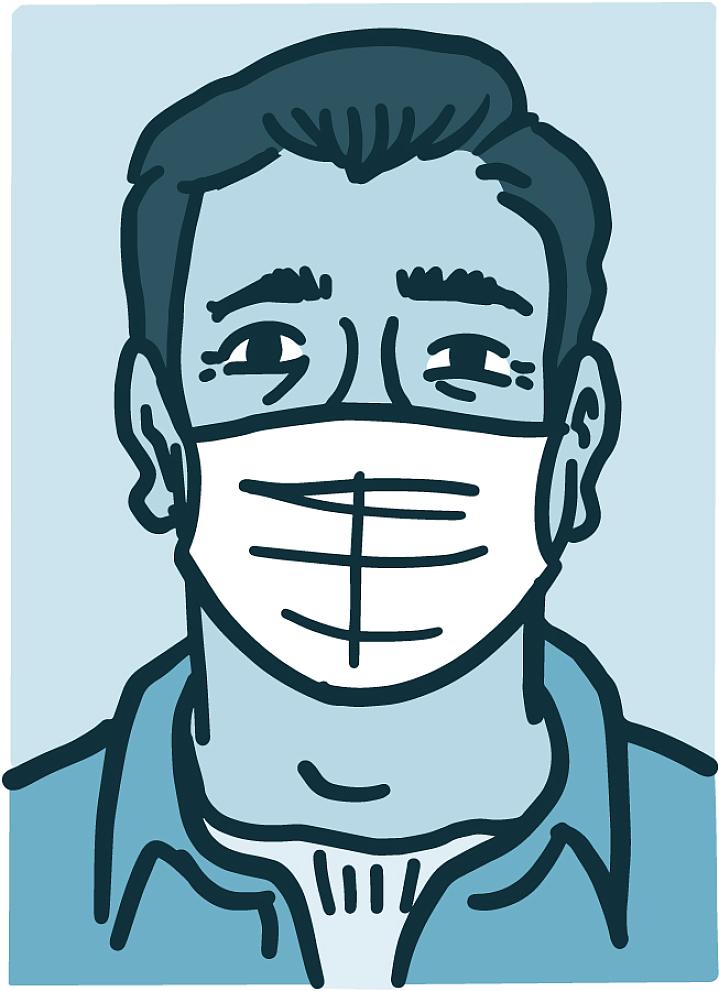Face Masks and COVID-19
Protecting Yourself and Others

To fight the spread of COVID-19, many places now require people to wear face masks. But the advice on wearing them has changed over the course of the pandemic. This has led some people to question: Do face masks even protect against COVID-19?
“Yes, absolutely,” says Dr. Adriaan Bax, a biophysicist at NIH. He has been testing how well different types of masks work. Masks, he explains, can help stop the spread of COVID-19 for a few reasons.
First, masks can trap fluid droplets that exit the mouth while you’re speaking. If you have COVID-19, these droplets contain virus that can be inhaled by others.
Bax and his colleagues have shown that just by talking, a person produces thousands of these little droplets every second. Speaking loudly or singing produces even more droplets.
Stopping droplets at the source is the easiest way to prevent the virus from spreading through the air. Wearing a mask can play a crucial role. Bax and colleagues have found that even a simple cloth mask can stop nearly all droplets produced during speech.
After droplets leave someone’s mouth, the water in them quickly evaporates. This causes the droplets to shrink. These shrunken droplets are called aerosols. They can float in the air for anywhere from minutes to hours. Once the virus is carried in such tiny aerosols, it becomes more difficult to stop.
Masks can also help protect the people wearing them. Studies have found that NIOSH-approved N95 respirators and KN95 masks block aerosols from entering the airway very effectively.* Surgical and cloth masks are less effective, but they still provide some protection. How well they work depends on the number of layers, choice of materials, and whether they’re worn properly.
Even if a mask doesn’t block all of the aerosols, it may still protect the wearer against severe disease. Severe COVID-19 tends to occur when virus gets into the lower airway and the lungs.
Wearing a mask may help the body clear out virus from the lower airway before it reaches the lungs. This is because, as Bax’s team has shown, wearing a mask traps the moisture that would otherwise escape when you exhale. This raises the amount of moisture in your airways (or the humidity).
Moisture is essential to promote the natural clearance process of the airways. This helps keep the lungs free of contamination by dust, pollutants, and viruses. Masks may aid this process by raising the humidity.
“Some may find wearing a mask uncomfortable, especially on hot and humid days. This is largely because of the humidifying effect. But this drawback is very minor compared to the benefit that masks offer,” says Bax.
For most people, cloth masks and surgical masks don’t interfere with normal breathing. Oxygen and carbon dioxide are much smaller than the respiratory droplets that carry the virus and pass easily through masks.
Masks work best when we all wear them. But with any mask, not all virus particles are blocked. That’s why it’s still important to stay a distance from others, generally about six feet. For tips on wearing masks, see the Wise Choices box.
And remember: Getting a COVID-19 vaccine is the best way to protect yourself and others from the virus.
*Editor's Note: "respirators and" were added to the text after publication for clarity.
NIH Office of Communications and Public Liaison
Building 31, Room 5B52
Bethesda, MD 20892-2094
nihnewsinhealth@od.nih.gov
Tel: 301-451-8224
Editor: Harrison Wein, Ph.D.
Managing Editor: Tianna Hicklin, Ph.D.
Illustrator: Alan Defibaugh
Attention Editors: Reprint our articles and illustrations in your own publication. Our material is not copyrighted. Please acknowledge NIH News in Health as the source and send us a copy.
For more consumer health news and information, visit health.nih.gov.
For wellness toolkits, visit www.nih.gov/wellnesstoolkits.



